
 On March 29, 2018, President Donald J. Trump proclaimed April as National Child Abuse Prevention Month and called on all Americans to invest in the lives of our nation’s children.
On March 29, 2018, President Donald J. Trump proclaimed April as National Child Abuse Prevention Month and called on all Americans to invest in the lives of our nation’s children.
Every day, far too many children across the country are exposed to physical, emotional, and/or sexual violence in their homes, schools, or communities. According to the OJJDP-sponsored 2014 National Survey of Children’s Exposure to Violence, nearly 61 percent of children surveyed had at least one form of direct exposure to violence, crime, or abuse in the past year. Ten percent of children had six or more direct exposures. Exposure to violence can cause children significant physical, mental, and emotional harm with long-term effects that can last well into adulthood.
Every April since 1983, communities across the country renew their commitment to ensuring the safety of children during National Child Abuse Prevention Month. OJJDP provides resources to support practitioners, researchers, and communities as they seek solutions to address child abuse and raise public awareness about the issue.
Through its Victims of Child Abuse Act programs, OJJDP provides support to children and families for the response to and healing of child abuse. The Office funds the development and expansion of children’s advocacy centers (CACs) nationwide and provides training and technical assistance for local CACs as well as child abuse professionals and prosecutors. Children’s advocacy centers coordinate the investigation and prosecution of child abuse cases and the treatment of victims using a proven multidisciplinary team approach. In 2017, 854 CACs served more than 334,000 children nationwide.
Protecting children has become more challenging with the prevalence of Internet access. OJJDP’s Internet Crimes Against Children (ICAC) task force program helps state and local law enforcement agencies prevent, interdict, and investigate technology-facilitated child sexual exploitation and Internet crimes against children. Since the program’s inception in 1998, ICAC task forces have reviewed more than 775,000 complaints of alleged child sexual victimization. These investigations have led to the arrest of more than 83,000 individuals.
There are 61 ICAC task forces nationwide with at least 1 in each state. Each task force conducts Internet safety outreach to increase public awareness of and prevent online child exploitation. In the past year, the task forces made more than 12,600 presentations on Internet safety and educated approximately 1.4 million people about potential dangers on the Internet.
The Office supports additional initiatives to address child abuse, violence, and neglect. The following are a few examples of OJJDP’s work:
- The OJJDP-funded National Center for Missing & Exploited Children offers critical intervention and prevention services to families and supports federal, state, and local law enforcement agencies in cases involving missing and exploited children. The center’s 24-hour telephone hotline (800–THE–LOST, or 800–843–5678) has become the nation’s centralized reporting system for suspected child sexual exploitation.
- With OJJDP support, the Department of Justice’s Office of Justice Programs manages the AMBER Alert program, which issues media alerts on radio, television, highway signs, wireless devices, and social media when a law enforcement agency determines that a child has been abducted and is in imminent danger. The program is in its 22nd year of operation and, as of March 2018, has helped rescue 924 children.
- With support from OJJDP, the National Academies’ Institute of Medicine and National Research Council have developed comprehensive guides for victim service providers, legal professionals, and health care professionals who work with children who have experienced, or are at risk of experiencing, commercial sexual exploitation and trafficking. The guides are derived from the OJJDP-commissioned report, Confronting Commercial Sexual Exploitation and Sex Trafficking of Minors in the United States, which provides a comprehensive overview of the issues and recommendations for action.
Resources:
Visit the National Criminal Justice Reference Service and the Department of Health and Human Services’ (HHS’) National Child Abuse Prevention Month website to find the latest resources and outreach materials on engaging communities in the prevention of child abuse. HHS’ 2018 Prevention Resource Guide: Keeping Children Safe and Families Strong in Supportive Communities focuses on protective factors that build on family strengths to foster healthy child and youth development.
OJJDP’s Model Programs Guide provides comprehensive information and resources on risk factors, protective factors, and evidence-based strategies for assisting children and youth exposed to violence and victimization.
The Office’s Child Forensic Interviewing: Best Practices highlights evidence-based approaches to interviewing children in cases of alleged abuse.On March 30, 2018, President Donald J. Trump issued a proclamation designating April 2018 as Second Chance Month. “Affording those who have been held accountable for their crimes an opportunity to become contributing members of society is a critical element of criminal justice that can reduce our crime rates and prison populations, decrease burdens to the American taxpayer, and make America safer,” President Trump said.
According to OJJDP’s Juvenile Residential Facility Census, 45,567 juvenile offenders were held in juvenile residential placement facilities on the census date in 2016. Bureau of Justice Statistics data show that in 2016 an additional 3,700 juvenile (those age 17 or younger) inmates were held in local jails and 956 juveniles were held in adult prisons. OJJDP’s Second Chance Act programs support state efforts to reduce recidivism and improve outcomes for youth returning to their communities after out-of-home placement.
In fiscal year (FY) 2017, OJJDP awarded more than $9 million in reentry mentoring grants for young parents. The programs work to enhance parenting skills and parent-child engagement, while providing services that are proven to reduce recidivism. To support the implementation of county and statewide plans to improve outcomes for youth in the juvenile justice system, the Office awarded grants to California, Georgia, Massachusetts, and Utah in FY 2017. The state plans will better align juvenile justice policy, practice, and resource allocation with what research shows works. The ultimate goal of these plans is to reduce recidivism and improve outcomes for juvenile offenders.
—OJJDP Administrator Caren Harp
Through its Second Chance Act Juvenile Reentry Legal Services program, OJJDP is helping community-based service providers deliver reentry services to youth following secure confinement or out-of-home placement. The program provides legal services to assist youth with securing drivers’ licenses, expunging criminal records, creating and/or modifying child support orders, finding and maintaining employment and adequate housing, and correcting credit reports.
OJJDP’s Initiative To Develop Juvenile Reentry Measurement Standards continues to help jurisdictions measure and assess juvenile reentry services more consistently and effectively—especially their impact on public safety and outcomes for youth. The Office is also working with the Performance-based Standards Learning Institute, Council of Juvenile Correctional Administrators, and Vera Institute of Justice to develop, test, and disseminate standards for measuring juvenile justice reentry practices and youth outcomes.
OJJDP is also providing Connecticut, Georgia, Guam, Indiana, Massachusetts, and New York with planning grants for training and technical assistance and policy support through its Smart on Juvenile Justice: Community Supervision Training and Technical Assistance Program. The grants were designed to help reduce recidivism and improve outcomes for juveniles by improving community supervision strategies. Connecticut, Georgia, Guam, Massachusetts, and New York have also received subsequent implementation grants.
“This month, we celebrate those who have exited the prison system and successfully reentered society,” President Trump said. “We encourage expanded opportunities for those who have worked to overcome bad decisions earlier in life and emphasize our belief in second chances for all who are willing to work hard to turn their lives around.”
Resources:
OJJDP recently released several research solicitations related to corrections and reentry. Applications must be made through Grants.gov, and are due at 11:59 p.m. ET on May 29, 30, and 31, respectively:
- Improving Juvenile Reentry Programs' Data Collection, Analysis, and Reporting
- Redesign Study of OJJDP's Juveniles in Corrections Data Collections
- Juvenile Reentry Research and Evaluation Program
Reentry Starts Here: A Guide for Youth in Long-Term Juvenile Corrections and Treatment Programs is a soon-to-be-released publication that OJJDP developed to help youth in juvenile corrections and treatment programs prepare for reentry and success in the community. Access other OJJDP aftercare and reentry publications online.
On January 19, 2018, OJJDP welcomed Caren Harp as its new Administrator. Ms. Harp is a former trial lawyer, director of the American Prosecutors Research Institute’s National Juvenile Justice Prosecution Center, and chief of the Sex Crimes Prosecution Unit in the Family Court Division of the New York City Law Department. Prior to her appointment as OJJDP Administrator, Ms. Harp was an associate professor at Liberty University School of Law.
OJJDP News @ a Glance staff recently sat down with Administrator Harp to discuss her career trajectory, the evolution of her views on juvenile justice, and her goals for the Office.
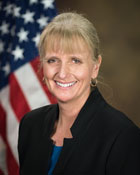 OJJDP Administrator Caren Harp
OJJDP Administrator Caren HarpWhat led you to pursue a career in law, and, specifically, in the juvenile justice field?
When I was a teenager living in California, I developed an interest in law after studying government in school. When the American Bar Association sponsored its annual Law Day activities, I signed up to shadow a lawyer who took me to a morning session of the Leslie Van Houten trial in Los Angeles Superior Court. Van Houten was the youngest of the Charles Manson followers on trial for the murders of Leno and Rosemary LaBianca. As I remember, Linda Kasabian, another Manson follower, testified that morning. It was fascinating. I was on the edge of my seat all morning. I was hooked.
Except for my time working for the New York City Law Department, I never focused exclusively on juvenile issues. In practice, my juvenile court assignments were one of many courts I covered, including felony criminal dockets. Even at the American Prosecutors Research Institute (APRI), I worked on elder fraud, domestic violence, and sexual assault projects in addition to my juvenile justice work. I think practicing in both juvenile and criminal court at the same time, and seeing the sad trajectory of youth from the juvenile system into criminal court, really informed my belief that we will never get a handle on our adult criminal population until we get a handle on our juvenile population.
Has your position on juvenile justice changed throughout your career? If so, what brought about the change?
It has changed. When I started in the late 1980s, violent crime was at historically high levels, and so much of what happened in court was viewed through the lens of public safety. After I went to work for APRI in the late 1990s, I began focusing more intently on juvenile justice issues. That’s when I began to see the value of a more balanced approach to juvenile justice, and to crime in general. During that time, I came to realize that prosecutors have a duty to both short-term and long-term public safety, and that incarceration addresses the short-term issue, but not the long-term problem. Courts need to resolve cases in balanced ways that protect communities, give victims’ needs high priority, make the individual accountability of offenders a nonnegotiable requirement, and encourage offenders to develop life skills so they can live productive, crime-free lives.
—Administrator Caren Harp
What are your short- and long-term goals for OJJDP? What impact do you hope your goals will have on the juvenile justice field?
We’ve made adjustments to our vision and mission statements that recapture a balanced approach to juvenile justice. We’re also reworking some of our fiscal year 2018 funding opportunities to reflect the important role of prosecutors in the court system, the need for comprehensive strategies to respond to violent and chronic juvenile offenders, and strategies to reduce gang activity and involvement.
Long term, we are overhauling how we help states comply with the core protections of the Juvenile Justice and Delinquency Prevention Act—especially as it relates to reducing disproportionate minority contact (DMC) with the juvenile justice system. Because we are committed to reducing DMC, we are trying something new. Instead of focusing on burdensome data collection requirements, we are going to emphasize intervention and evaluation. We want to partner with states to implement action plans and outcome-based evaluations that have not been part of the DMC requirement before, and we’re optimistic about the success of a strategy that focuses on solutions rather than the process of gathering data.
What would you like people to know about you as OJJDP Administrator?
As OJJDP Administrator, I believe that we should value and accept all youth for who they are and empower them to become law-abiding citizens. An integral part of that responsibility is holding youth accountable for their actions. Unfortunately, some youth will come into contact with the justice system through unfortunate circumstances in their lives. However, these issues do not give them license to harm or victimize others. Circumstances may explain what prompted a young person to act, and they will give the court insight into how to craft a disposition, but they do not excuse behavior. If we fail to help children accept responsibility for their conduct in an age-appropriate fashion, we set them up to fail in profound and long-lasting ways.
All children are capable of overcoming harsh circumstances. With opportunities, hard work, self-discipline, and the guiding hand of a concerned adult, kids can achieve amazing things, and they can do whatever they set their minds to in life.
We have the finest court system in the world. Where there are problems, we work to fix them. Where there are injustices, we seek justice. The court system works best when it adheres to the rule of law, tempers justice with mercy, and deals fairly and equitably with every person brought before the bench. It’s an honor to be a part of the legal profession, and a privilege to serve as Administrator of OJJDP.
 Dennis Mondoro, OJJDP Strategic Community Development Officer.
Dennis Mondoro, OJJDP Strategic Community Development Officer.Photo courtesy of Mr. Mondoro’s family.
Word of his death spread quickly among OJJDP staff and the many juvenile justice professionals across the country who Dennis had worked with throughout the years. The breadth of Dennis’ activities—his work with the National Gang Center, his advocacy for OJJDP’s work on community supervision, supporting states’ efforts to comply with the core protections of the Juvenile Justice and Delinquency Prevention Act, and his work on community youth violence prevention—brought him into constant contact with juvenile justice professionals at every level in every state.
“I knew Dennis for only a few brief weeks,” said OJJDP Administrator Caren Harp. “In that short time, I was impressed with his passion for his work, his dedication to our nation’s youth, his sense of humor, and how well he engaged with others. His skills with people and knowledge cannot be replaced.”
Dennis joined OJJDP in 1999. During his nearly two decades at OJJDP, he wore many hats. He began his OJJDP career as a state representative in the State Relations and Assistance Division. Over the next few years, he was instrumental in the development of OJJDP’s Comprehensive Strategy for Serious, Violent, and Chronic Juvenile Offenders; served as compliance monitor; managed the division’s training and technical assistance efforts; and served as a region chief, where he supervised six staff members while continuing to manage his state grants.
In 2004, Dennis was named a policy advisor focused on youth gangs and youth violence prevention. Following a reorganization in 2013, Dennis joined the Juvenile Justice System Improvement Division, where he served as a program manager and a senior policy advisor on youth gangs, community supervision, and community violence prevention programs. More recently, in addition to his other responsibilities, Dennis took on work as a compliance analyst in the Core Protections Division. Dennis would sometimes jokingly tell his supervisors: “Keep me busy; don’t let me not be busy.”
OJJDP Administrators often turned to Dennis for information on the juvenile justice system, policy development, and insight on how the juvenile justice system functioned at the state level. Kellie Blue, Associate Administrator and his supervisor in the Juvenile Justice System Improvement Division said of Dennis, “He was a rock when our division was getting started. He kept on telling me ‘don’t worry, we can get it done.’”
The states had no stronger advocate. Dennis was constantly in touch with OJJDP stakeholders in the states; he worked to ensure that the states had access to the most current resources, evidence-based programs, and training and technical assistance. Before his employment at OJJDP, Dennis served as a probation officer in nearby Fairfax County, VA. He sometimes introduced himself as a recovering probation officer when speaking to state and local professionals as a way to connect with his audience. He always connected with the people in the juvenile justice field in a personal way. He would shake the hands of youth in detention facilities and look them in the eye as he conversed with them.
As word of Dennis' passing spread among the juvenile justice community across the country, many of the people who knew Dennis and had been touched by his work reached out to OJJDP to offer condolences or share their favorite memory of him. Following are a few of the messages that OJJDP received:
- Shay Bilchik, former OJJDP Administrator and current Director at the Center for Juvenile Justice Reform at Georgetown University: "Dennis had a unique combination of characteristics that made him who he was—smart, caring, thoughtful, fun loving, athletic, committed to others, and the guy you wanted on your side of any battle. He was tenacious! The fact that he devoted his career to children, youth, and families was a gift to all of us. Thank you, Dennis for all you did to better the lives of those most disadvantaged among us. Rest in peace."
- Jen Covino, Simon and Company Vice President: "Over the years, Dennis provided policy expertise and guidance to local elected officials and community partners in Tacoma, WA, as they worked to implement the OJJDP model of anti-gang violence strategies in targeted neighborhoods. It was such a pleasure to work with him on behalf of Tacoma; his sense of humor, focus on positive outcomes, and willingness to go the extra mile was a welcome respite. Dennis embodied all that is good in Americans who choose a career in public service, seeking to promote positive change within vulnerable communities. The value of those efforts is felt in the youth who received supportive services and gained greater opportunities. I sincerely hope that his family, friends, and colleagues will find some solace in knowing that his memory will live on in the communities where the work and cause endure."
- Meena Harris, Director of the National Gang Center: "Dennis had a vision for the National Gang Center. He adeptly understood its strategic alignment within the juvenile justice field and within the Department of Justice’s mission more broadly. Even though he possessed a tremendous amount of institutional and subject matter knowledge spanning his long career, he had a calm, unassuming, down-to-earth way of interacting with people in the field. His good-natured sense of humor and positive outlook on the work left people with a lasting impression. Dennis was at a high point in both his life and his occupation, yet had not even come close to a pinnacle. He was cherished by many and his legacy will never be forgotten by those who had the fortune of knowing him."
Read additional tributes to Dennis Mondoro.
 Dennis Mondoro.
Dennis Mondoro.Photo courtesy of Mr. Mondoro’s family.
- Karen J. Bachar, OJJDP Senior Policy Advisor: "I will miss him for his commitment to this nation’s children and his dry sense of humor. I knew who to chat with when I needed a laugh. May all who loved him find peace."
- Jeff Gersh, OJJDP Deputy Associate Administrator: "My deepest and most sincere condolences to the Mondoro family. Dennis was one of the kindest most generous people I have ever had the opportunity to know and work with. On countless occasions, Dennis would stop by my office to check in and chat and see how I was doing (always personally first and professionally second). At any point when the conversation would get too difficult, I could count on Dennis to flash his trademark smirk and then wiggle his ears…and it never failed to make me laugh. To Jake and Jenna, please know that your father talked about you constantly, was extremely proud of you and loved you both dearly. He will be missed by all. I will continue to keep you all in my thoughts and prayers."
- Dave Kuker, Iowa Department of Human Rights, Division of Criminal and Juvenile Justice Planning: "He was here on a compliance visit one fall in the late '90s. We were on the road to Atlantic, IA. We were engaged in verbose discussion regarding the overall superiority of Iowa corn. We stopped the state car and I sent him into a corn field. He grabbed an ear and took it back in his luggage; he was going to give it to his kids as a souvenir. Every time I saw him thereafter, I reminded him of it. He laughed; we laughed."
- Theresa Lay-Sleeper, Juvenile Justice Specialist, Vermont Department for Children and Families Commissioner’s Office: "Holding you all in light and love. Dennis—that grin. That’s all."
- Laurel S. Marks, Manager, Juvenile Services Section, Virginia Department of Criminal Justice Services: "When we were at the National Conference in Nashville, Dennis and I went for a run. My recollection was that we weren’t going very far because he had a flight to catch, so we didn’t bring any water. We got totally lost, and ended up running far longer than we intended. We went in desperation to a Burger King to get water, and then somehow found ourselves running on the highway in an attempt to get back to the hotel. We were gone so much longer than intended that he missed his flight."
- Adam Spector, Office of Justice Programs (OJP) Congressional Affairs Specialist: "On behalf of the staff of OJP's Office of Communications, our deepest sympathies to Dennis' friends and family. Dennis was always great to work with. He responded quickly and thoroughly to our many information requests. More importantly, he was simply a good, decent and kind person. He took his work seriously without taking himself seriously. Dennis had a wonderful sense of humor. He will be sorely missed."
- John A. Tuell, Executive Director, Robert F. Kennedy National Resource Center for Juvenile Justice, Robert F. Kennedy Children’s Action Corps: "I had the privilege of working with Dennis during his tenure in the Fairfax County Juvenile Court and he was good at what he did. In fact, after I joined OJJDP in 1996, I encouraged him to join me and am blessed with the memories from his choice to come aboard. We partnered in leading the Comprehensive Strategy, which resulted in a 3-year technical assistance frenzy in sites all over the country. We shared an incredible enthusiasm for these opportunities during a mutual period of personal transition. With our passion for that which we cared most about, including running and our kids, the memories of our intensity from 8 a.m. to 5 p.m. and from 6 p.m. to 2 a.m. will never be forgotten. I always enjoyed that we were on the same side. The recent 3-year period of working together again reminded me of the special value of his friendship. Dennis was a really good man! Along with legions of others, I will miss him mightily."
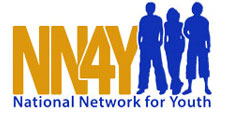 On March 19–20, 2018, the National Network for Youth hosted its annual National Summit on Youth Homelessness in Washington, DC. Dr. Sanzanna Dean, OJJDP Senior Policy Advisor, attended the event’s federal agency roundtable discussion alongside representatives of the Departments of Education, Health and Human Services, Housing and Urban Development, and Labor as well as the United States Interagency Council on Homelessness.
On March 19–20, 2018, the National Network for Youth hosted its annual National Summit on Youth Homelessness in Washington, DC. Dr. Sanzanna Dean, OJJDP Senior Policy Advisor, attended the event’s federal agency roundtable discussion alongside representatives of the Departments of Education, Health and Human Services, Housing and Urban Development, and Labor as well as the United States Interagency Council on Homelessness.
Every year, the National Network for Youth brings together federal staff to discuss participating agencies’ efforts to address youth homelessness. Representatives describe and respond to questions about their respective agencies’ current efforts and make at least one new commitment for the upcoming year to support young people experiencing homelessness. This year, the Department of Justice—through OJJDP—committed to continue collaborating with partners and improving information dissemination among local and national stakeholders
Dr. Dean highlighted how the Department of Justice and OJJDP are addressing youth homelessness. This includes OJJDP’s work with the Bureau of Justice Statistics (BJS) to collect data directly from youth by adding several questions on living arrangements to the National Survey of Youth in Custody. The survey is part of BJS’ National Prison Rape Statistics program, which gathers mandated data on the incidence and prevalence of sexual assault in juvenile facilities under the Prison Rape Elimination Act of 2003.
Survey questions included:
- Who was responsible for taking care of you when you were growing up?
- At the time you were first taken into custody for the crime(s) that led to your stay here, who were you living with?
- Was this grandparent/other relative/grand parent or other relative a foster parent?
- At the time you were first taken into custody for the crime that led to your stay here, were you homeless, living in a shelter, or other temporary housing?
Data collection is underway and OJJDP hopes that these data will provide a valuable snapshot of the living arrangements of youth entering the juvenile justice system. Through the use of individualized assessments and reentry and transition planning, facilities will be better able to support youth in transition to safe and stable housing upon release.
OJJDP remains dedicated to addressing youth homelessness. “Our agency goals are to enhance public safety, ensure accountability, and empower youth. However, I also plan to address issues faced by homeless youth,” said Administrator Harp. “Criminalizing homelessness further marginalizes and disadvantages this already vulnerable youth population, which does no one any good.”
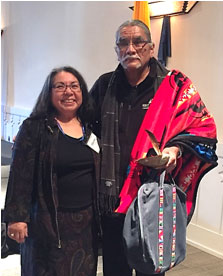 Dr. Dolores Subia Bigfoot, Director of the OJJDP Tribal Youth Training and Technical Assistance Center, with invited guest Thomas Goodluck.
Dr. Dolores Subia Bigfoot, Director of the OJJDP Tribal Youth Training and Technical Assistance Center, with invited guest Thomas Goodluck.
Photo courtesy of Natalie Stites.
“We are here today to help you get your Tribal Youth Program or Juvenile Healing to Wellness Court grants off to a good start,” said OJJDP Deputy Administrator Eileen M. Garry in her opening remarks at the March 13–15, 2018, meeting in Albuquerque, NM. More than 100 grantees attended the training hosted by OJJDP’s Tribal Youth Training and Technical Assistance (TTA) Center. “We designed this gathering to serve you and the needs of your programs,” Ms. Garry said. “Our hope is that you will leave Albuquerque with a clear vision of where you want your program to go and the steps you will take to accomplish your goals.”
The meeting began with a traditional opening by Thomas Goodluck, a licensed drug and alcohol counselor and member of the Diné Navajo tribe, and included remarks from Dr. Dolores Subia Bigfoot, director of the Tribal Youth TTA Center. Dr. Evan Elkin, executive director at Reclaiming Futures, spoke about the complex role youth justice systems play in achieving public health and well-being and tribal representatives and former grantees shared their program experiences and lessons learned on building effective programs for youth.
Grantees attended sessions on creating mission and vision statements, community advisory committees, logic models, SMART (Specific, Measurable, Attainable, Relevant, and Timely) goals and objectives, developing comprehensive data collection and evaluation plans, and planning for sustainability. OJJDP Grant Program Specialists Keisha Kersey and Kara McDonagh shared key aspects of effective grant management. The meeting ended with a session on trauma-informed care and the core principles for justice improvement. OJJDP Deputy Associate Administrator Jeffrey Gersh provided closing remarks.
On February 13–14, 2018, 15 Alaska-based CTAS grantees attended a state-specific strategic planning training in Anchorage, AK. The training was hosted by the Rural Alaska Community Action Program’s (RurAL CAP's) Resource Basket Training and Technical Assistance Center.
Following a traditional opening by Native Village of Nulato member Robert Ruzicka, RurAL CAP staff members Tara Stiller, Greg Anelon, Amy Modig, and Joel Turman facilitated workshops on developing mission and vision statements, community advisory committees, logic models, SMART goals and objectives, data collection, evaluation, and sustainability.
Dorothy Edwardsen, Chief Judge and Tribal Court Administrator from the Native Village of Barrow, and attorney Kimberly Martus spoke with attendees about building effective tribal youth court systems in Alaska. Resource Basket TTA Center Director Cathie Clements presented on Alaska’s promising positive youth development strategies and resources available to tribes. The event also afforded participants many opportunities for peer learning during which grantees reflected on their programs’ common challenges and effective strategies to successfully implement programs for Alaska Native youth.
OJJDP will provide ongoing training and technical assistance to the grantees via webinars and other resources available through the Tribal Youth TTA Center and the Resource Basket. Although the TTA centers work extensively with OJJDP grantees, they also provide TTA, including access to free virtual simulation trainings, to federally recognized tribes that are not grantees.
Resources:
Additional information about the Office’s tribal youth programs and services is available on the OJJDP website.
By Jimmy Pierce, Founder and Executive Director, Kids Making It
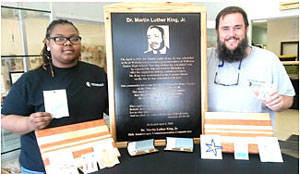
Kids Making It Lead Apprentice Ashley Butler with Apprentice Program Manager Billy Phillips.
Photo courtesy of Kids Making It.
OJJDP funding through the North Carolina Governor’s Crime Commission allows us to offer five different programs to youth residing in the Wilmington, NC, area. Participants in the Vocational and Entrepreneurial afterschool program, our core initiative, learn woodworking and receive long-term mentorship and vocational instruction. Items produced in the program are sold in our gift shop; this serves as an introduction to the free market system. Every month, our teens earn 100 percent of the profits from their product sales. With local gangs recruiting members from elementary schools in our area, we now offer Introductory Woodworking classes for preteens as a gang-intervention strategy. Participants learn to use hand tools and build a project for themselves. When they turn 13, they are invited to join the afterschool program.

Program participants with their sales profit checks. From left to right: Austin Wilson, Montay Howard, Josè Rodriguez, Julius Hall, Jasmine Robinson, and Ariyana Patrick.
Photo courtesy of Kids Making It.
We also offer an apprenticeship program for unemployed high school graduates who are not going to college. Teens receive paid training positions and complete larger production orders for the public. Through the program, youth learn to adhere to workplace standards such as punctuality, scheduling, and quality control. Products include engraved jewelry and ornaments that they market to gift shops on the east coast, as well as cutting boards, desk sets, pens, and custom-crafted signs.
For our Summer Jobs program, we partner with another local nonprofit to place older teens in paid summer jobs as an alternative to hanging out on the streets.
This month, Kids Making It is breaking ground on a 4,200-square-foot addition to house our new Skilled Trades program. We will introduce older teens to the basics of plumbing, electrical, masonry, construction carpentry, heating, ventilation, and air conditioning. By partnering with local contractors, we will be able to place youth in paid apprenticeships as a pathway into the construction industry.

Summer Jobs teens include, from left to right: Julius Hall, Austin Wilson, Montay Howard, Tiondrè Courtar, and Eric Deese.
Photo courtesy of Kids Making It.
Since 1994, we have successfully served more than 4,500 youth. Our teens have a zero dropout rate and their involvement with the juvenile justice system is less than 2 percent. We attribute the success of our kids to the following factors:
- Participants learn to design and build things with their hands, leading to a sense of empowerment and self-esteem.
- Most of our programs offer youth the opportunity to earn regular income beginning at age 13.
- The design-build process is a hands-on application of STEM (science, technology, engineering and mathematics) learning that gives teens a deeper understanding of and appreciation for their schoolwork.
- We are invested in our kids for the long haul to help them stay on track and, as a result, many return year after year.
Kids Making It is invested in the success of our teens and is committed to helping youth thrive in spite of their circumstances. Our unique, award-winning model for helping at-risk and court-involved youth works and can be replicated with success at any budget level.
James “Jimmy” Pierce is the founder and executive director of Kids Making It. For more than 20 years, he has shared his passion for woodworking to build a network of support for at-risk youth while building bridges with community partners and local businesses in Wilmington, NC.
According to a U.S. Department of Health and Human Services preliminary report, on a single day in 2016, there were an estimated 437,465 youth in foster care in the United States. Risk factors associated with youth being in foster care are also common risk factors for future justice system involvement. Consequently, a better understanding of what interventions may help prevent offending and justice system involvement for this at-risk population of youth is an important public safety consideration.
In 2013, OJJDP funded researchers from Portland State University to investigate whether the My Life program for youth in foster care prevented or reduced criminal offending as young adults. This mentoring program model incorporated both individual and group mentoring to improve transition outcomes for youth in foster care who were between the ages of 16 and 18. The program focused on goal setting, self-determination, and problem-solving skills. The study built on 2 previous randomized trials involving more than 150 youth by extending the followup of study participants into early adulthood. The researchers collected measures of criminal justice involvement by examining self-reported arrests, convictions, incarceration or probation periods, and other offending behavior measures. They also examined whether gender, disability, or prior delinquency behaviors were associated with differences in impact.The researchers found that for males in the study—who also were found to have the highest likelihood of criminal justice involvement as adults—participating in the My Life mentoring program had a statistically significant effect on reducing criminal justice involvement and the likelihood of being incarcerated. In addition, the researchers found that the mentoring program appeared to have a protective effect on youth who did not have prior histories of delinquency because those who participated in the program had fewer incarcerations than those who did not participate.
These findings help advance the understanding about how a mentoring program geared toward youth in foster care may also help reduce the likelihood of future criminal justice involvement for this at-risk group. The research suggests that this type of targeted mentoring can be an important tool in preventing and reducing offending in early adulthood and improving safety in communities.
For further information, see Evaluation of the Effects of a Mentoring Program for Youth in Foster Care on Their Criminal Justice Involvement as Young Adults.The Juvenile Justice and Delinquency Prevention Act that established OJJDP authorizes the Administrator to conduct research and evaluations and undertake statistical analyses on issues related to juvenile offending and victimization. Because OJJDP is the only Office of Justice Programs agency with dual mandates for research and programs, we are uniquely positioned to integrate research in our programmatic functions, and we are committed to translating research into practice.
Look to this recurring column authored by members of OJJDP’s Research Unit to distill topically relevant and timely OJJDP-supported research.
Blueprints for Healthy Youth Development Conference: April 30–May 2, 2018
 This conference is sponsored by OJJDP, The Annie E. Casey Foundation, and the Center for the Study and Prevention of Violence at the University of Colorado, Boulder. Presenters will disseminate science-based information on programs that have the highest standards for promoting education, behavior, emotional well-being, physical health, and positive relationships. The event will be held in Denver, CO. Registration information is available online.
This conference is sponsored by OJJDP, The Annie E. Casey Foundation, and the Center for the Study and Prevention of Violence at the University of Colorado, Boulder. Presenters will disseminate science-based information on programs that have the highest standards for promoting education, behavior, emotional well-being, physical health, and positive relationships. The event will be held in Denver, CO. Registration information is available online.
Designing and Building a Successful Mentoring Program: May 10, 2018
The Governor’s Prevention Partnership is sponsoring this training in Wethersfield, CT. Participants will learn how to design a responsive and performance-based youth mentoring program, identify a mentoring program model most suitable for their organization, and apply resource materials for mentor program development and volunteer management. Registration information is available online.
Working With Transgender and Gender Nonconforming Adolescents in a Clinical Context (Part 1): May 10, 2018
Part 1 of this webinar series focuses on gender identity development. The webinar will focus on why it is important to consider an individual’s stage of development in relation to issues of gender nonconformity or gender dysphoria. The event is sponsored by OJJDP and the Midwest Regional Children’s Advocacy Center. Registration information is available online.Child Homicide Investigations: May 14–15, 2018
The National Criminal Justice Training Center will host this training in Boise, ID. The event focuses on understanding and building relationships between the forensic pathologist, homicide investigator, and prosecutor to successfully investigate and prosecute child homicide cases. Participants will learn autopsy protocols, forensic essentials, and the criticality of determining the cause and manner of death. Registration information is available online.
Working With Transgender and Gender Nonconforming Adolescents in a Clinical Context (Part 2): May 24, 2018
Part 2 of this webinar series focuses on clinical applications of working with adolescents who are transgender or gender nonconforming. The event is sponsored by OJJDP and the Midwest Regional Children’s Advocacy Center. Registration information is available online.
Restorative Justice for Tribal Youth: Philosophy and Practice: May 29, 2018
OJJDP’s Tribal Youth Training and Technical Assistance Center will host a webinar on the second part of its restorative justice series. The topic is restorative justice for tribal youth: philosophy and practice. Registration information is available online.
19th Global Youth Justice Training Institute: June 12–14, 2018
 Global Youth Justice will sponsor this training in Cape Cod, MA. Participants will learn strategies to establish or enhance local volunteer-driven juvenile justice and youth justice diversion programs called teen/youth/student/peer court or peer jury. Topics include training youth and adult volunteers; providing quality community service placements, programmatic enhancements, and operational strategies; grant writing; and funding opportunities. Registration information is available online.
Global Youth Justice will sponsor this training in Cape Cod, MA. Participants will learn strategies to establish or enhance local volunteer-driven juvenile justice and youth justice diversion programs called teen/youth/student/peer court or peer jury. Topics include training youth and adult volunteers; providing quality community service placements, programmatic enhancements, and operational strategies; grant writing; and funding opportunities. Registration information is available online.
School Resource Officer Training Conference: June 12–14, 2018
This training will be hosted by the National Criminal Justice Training Center in Appleton, WI. This event will bring together law enforcement and school personnel to address school violence and youth victimization concerns through the use of crime prevention and response strategies. Participants will examine the impacts of trauma on youth and effective strategies for working with students who are experiencing mental illness and learning disabilities. Registration information is available online.
American Professional Society on the Abuse of Children Annual Colloquium: June 13–16, 2018
The American Professional Society on the Abuse of Children is sponsoring this event in New Orleans, LA. More than 70 advanced training institutes and workshops will address all aspects of child maltreatment, including prevention, assessment, intervention, and treatment with victims, perpetrators, and families affected by physical, sexual, and psychological abuse and neglect. Cultural considerations will also be addressed. Registration information is available online.
Tribal Youth and Substance Use: Session 2 – Application of Culturally Relevant Screening and Assessment Processes: June 19, 2018
OJJDP’s Tribal Youth Training and Technical Assistance Center will host the second of a two-part webinar on tribal youth and substance abuse. The webinar will address the application of culturally relevant screening and assessment processes. Registration information is available online.
At the Intersections: How Federal, State, and Local Partners Can Work Together to Improve Juvenile Justice: June 27–30, 2018
This conference, to be held in Washington, DC, is sponsored by the Coalition for Juvenile Justice. It will focus on the latest research, developments, and challenges facing the juvenile justice field and will address questions such as: How can states and communities serve as leaders in shaping a better juvenile justice system? and What role does advocacy play as communities seek to improve services and provide for trauma-informed care for children and youth? Registration information is available online.
Domestic Child Sex Trafficking and Children in Foster Care: June 28, 2018
Justice Clearinghouse is sponsoring this webinar. It will address domestic child sex trafficking with the goal of understanding the victim’s perspective, especially those victims who are involved with the child welfare system. The session will explore what makes children in care particularly vulnerable to trafficking, including an understanding of the victim’s trauma experience and behavior, advice on how to communicate with victims through a trauma-informed approach, and practical implications for bringing a case to trial. Registration information is available online.
It Really Is “Normal To Be Normal” in Child Sexual Abuse: June 28, 2018
 This webinar is sponsored by OJJDP and the Midwest Regional Children’s Advocacy Center. A child abuse pediatrician will describe the medical evaluation for a child suspected of having been sexually abused, with emphasis on why physical and laboratory findings are often absent. Reasons why children typically delay disclosure will be presented. Strategies and techniques for court preparation when a case of suspected child sexual abuse with a normal exam is being presented for civil hearing or criminal trial will also be discussed. Registration information is available online.
This webinar is sponsored by OJJDP and the Midwest Regional Children’s Advocacy Center. A child abuse pediatrician will describe the medical evaluation for a child suspected of having been sexually abused, with emphasis on why physical and laboratory findings are often absent. Reasons why children typically delay disclosure will be presented. Strategies and techniques for court preparation when a case of suspected child sexual abuse with a normal exam is being presented for civil hearing or criminal trial will also be discussed. Registration information is available online.
13th Annual National School Safety Conference and Exposition: July 23–27, 2018
The School Safety Advocacy Council is sponsoring this event, to be held in Orlando, FL. This conference focuses on all aspects of school safety and security from kindergarten through college. It offers preconference trainings and more than 40 breakout sessions by current professionals in the fields of education and school safety who will address the most pressing issues facing schools today. Registration information is available online.
Conducting Child Abuse Investigations: July 30–August 3, 2018
The National Criminal Justice Training Center will host this training in Greenville, SC. Attendees will learn about the types of injuries a child may sustain and those that may or may not be the result of physical or sexual abuse, the characteristics of child abuse victims and offenders, preferred practices for interviewing minor victims and offending suspects, and legal considerations for investigating and prosecuting child physical and sexual abuse cases. Registration information is available online.
Administrator Harp Hosts Listening Session at National Conference on Juvenile Justice
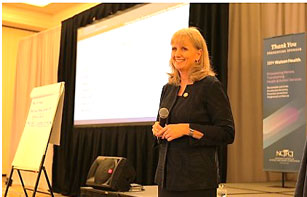
Administrator Harp answers a question during the March 20, 2018, listening session. Ms. Harp engaged the attendees in discussions about how OJJDP can best support their work. “What do you need from us?” she asked.
Photo by Kelly Davis, courtesy of Juvenile Justice Information Exchange.
Before opening the floor for questions, Administrator Harp discussed her work in the criminal and juvenile justice fields; emphasized the importance of a balanced approach to public safety, offender accountability, and youth development; and outlined her vision and priorities for OJJDP. She noted that these priorities align with goals she helped to develop in the NCJFCJ publication Juvenile Delinquency Guidelines: Improving Court Practice in Juvenile Delinquency Cases.
NCJFCJ is a longtime and valued partner of OJJDP and recently worked with OJJDP and other stakeholders to develop evidence-based, treatment-oriented guidelines for juvenile drug treatment courts. The guidelines are currently in review. OJJDP also supports NCJFCJ’s National Judicial Institute on Domestic Child Sex Trafficking, which has trained 193 judges to date.
OJJDP staff presentations at this year’s conference included, The Judiciary’s Role in Promoting Police and Youth Engagement, Child Sex Trafficking Indicators and Responses for Judicial Officials, Estimating Incidence Rates and Implementing Best Practices for Dual System Youth, and Bridging Research and Practice in Juvenile Justice: A Developmental Approach to Youth Probation.
Administrator Harp Discusses Resources for Counties at National Legislative Conference
On March 3, 2018, Administrator Harp addressed the National Association of Counties Legislative Conference in Washington, DC. The annual meeting brings together more than 2,000 county officials to discuss federal policy issues.
Ms. Harp spoke during the Justice and Public Safety Policy Steering Committee morning meeting alongside Michael McKeown, Executive Director of the U.S. Department of Homeland Security’s Homeland Security Advisory Council, and Mark Luttrell, Mayor of Shelby County, TN. Other federal attendees included Elaine L. Chao, U.S. Secretary of Transportation; David J. Shulkin, U.S. Secretary of Veterans Affairs; Wilbur Ross, U.S. Secretary of Commerce; and William “Brock” Long, Administrator of the Federal Emergency Management Agency.
Administrator Harp acknowledged that rural and smaller counties often have difficulty obtaining support for their programs and provided information on OJJDP Formula Grants program funding available to states. Ms. Harp highlighted OJJDP resources that the counties can use to reduce violent crime, combat gang activity, support law enforcement, and protect communities, and pledged OJJDP support for state and community efforts to prevent and respond to delinquency. She also updated attendees on the priorities she formulated with agency staff to enhance public safety, ensure offender accountability, and empower youth to live productive, crime-free lives.
Deputy Administrator Garry Addresses State Advisory Group in Idaho
On March 8, 2018, OJJDP Deputy Administrator Eileen M. Garry participated in a meeting with Idaho’s state advisory group (SAG) known as the Idaho Juvenile Justice Commission (IJJC). The visit was part of a focused effort by OJJDP to strengthen relationships with SAGs. SAGs nationwide are responsible for monitoring and supporting their respective state’s or territory’s progress in complying with the core protections of the Juvenile Justice and Delinquency Prevention Act and fulfillment of the state's or territory’s 3-year plan.
Deputy Administrator Garry thanked IJJC members for their dedication to improving Idaho’s juvenile justice system and recognized several of the commission’s accomplishments and programs. One such initiative, Policing the Teen Brain, aims to improve police-youth relationships by providing training for law enforcement officers on successfully interacting with teens. Law enforcement’s overwhelmingly positive response has encouraged IJJC to expand training to community-based organizations serving youth statewide.
Ms. Garry also praised the state’s commitment to engaging youth by improving outreach to Native American youth through their Tribal Council, collaborating with youth groups to expand IJJC’s Youth Council, and partnering with formerly incarcerated youth.
National Missing Children’s Day Ceremony To Be Live Streamed
The Department of Justice’s commemoration of National Missing Children’s Day will take place on May 23, 2018, in Washington, DC. The annual event, organized by OJJDP, honors the memory of missing children and recognizes extraordinary efforts made by law enforcement personnel and private citizens to protect children from harm.Awards to be presented this year include the Attorney General’s Special Commendation, Missing Children’s Law Enforcement Award, Missing Children’s Child Protection Award, and Missing Children’s Citizen Award. The winner of the National Missing Children’s Day Poster Contest will also be recognized. The contest is intended to promote awareness and encourage teachers, parents, guardians, and other adults to engage children in discussions about safety.
The ceremony will be live streamed on May 23 and the recording will remain available online.
To access resources for families of missing and abducted children, visit the OJJDP and National Center for Missing & Exploited Children websites.
CyberTipline for Missing and Exploited Children Reaches 20-Year Milestone
OJJDP partners with the National Center for Missing & Exploited Children (NCMEC) to provide resources, technical assistance, and services to victims, families, and the public, and to support law enforcement agencies with cases involving missing and exploited children.
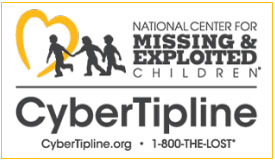
NCMEC’s 24-hour CyberTipline (800–THE–LOST, or 800–843–5678) is the nation’s centralized reporting system for suspected child sexual exploitation. The CyberTipline allows the public and electronic service providers to report suspected online enticement, child sexual molestation, child pornography, child sex tourism, child sex trafficking, obscene materials sent to a child, and misleading domain names, words, or digital images on the Internet. Since its inception in 1998, the CyberTipline has received more than 27 million reports, most of which were reports of child sexual abuse materials online. In 2017 alone, the line received more than 10.2 million reports, a 23-percent increase from the previous year.
NCMEC analysts review each tip and work to identify potential locations for reported incidents so they may be forwarded to the appropriate law enforcement agency for investigation. NCMEC also uses CyberTipline information to engage the Internet industry on initiatives to reduce the proliferation of child sexual abuse images, shape its prevention and safety messages, and create and tailor safety and victimization prevention publications for educators, parents, and the public.
OJJDP Releases Data Snapshot on Girls in the Juvenile Justice System
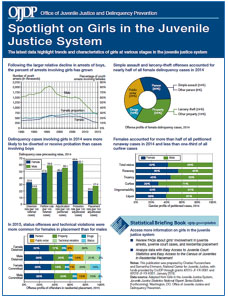 The latest publication in OJJDP’s Data Snapshot series focuses on trends and characteristics of girls at various stages in the juvenile justice system, including arrest, the juvenile court process, and residential placement.
The latest publication in OJJDP’s Data Snapshot series focuses on trends and characteristics of girls at various stages in the juvenile justice system, including arrest, the juvenile court process, and residential placement.
The data show that the proportion of juvenile arrests involving girls has grown in the past two decades. The data also indicate that in 2014, simple assault and larceny-theft offenses accounted for nearly half of all delinquency cases involving females, and that females accounted for more than half of all petitioned runaway cases.
The Data Snapshot series is available via OJJDP's Statistical Briefing Book. The series disseminates current research and statistical information about youth and the juvenile justice system. Each one-page snapshot focuses on a specific topic and highlights policy-relevant findings.
Access the full list of Data Snapshots and keep up with the Statistical Briefing Book on Twitter.
OJJDP Hosts Juvenile Justice Roundtable With 4–H Students
On April 10, 2018, OJJDP staff hosted 15 youth delegates from 4–H for a juvenile justice roundtable. The youth were in Washington, DC, to participate in the 2018 National 4-H Conference. The annual event teaches youth how to research and develop specific plans to address a critical issue and present their plans in formal briefings with federal agencies.
In preparation for the convening, delegates were given a challenge question to address. The youth who attended the OJJDP roundtable were encouraged to brainstorm ideas in response to the following question: “Based on your experiences and/or those of your peers, what can OJJDP do to improve law enforcement engagement with youth?” The information shared at the roundtable will inform OJJDP staff on the thinking and priorities of today’s youth and will provide an opportunity for the youth to explore potential future educational and vocational opportunities related to public safety.
The 2018 National 4–H Conference was held on April 7–12, and was attended by 25 youth delegates ages 15 to 19.All OJJDP publications may be viewed and downloaded on the publications section of the OJJDP website. Print publications may be ordered online at the National Criminal Justice Reference Service website.
Coming Soon—
Reentry Starts Here: A Guide for Youth in Long-Term Juvenile Corrections and Treatment Programs
OJJDP developed this guide to help youth in juvenile corrections and treatment programs prepare for reentry and success in the community. The guide is divided into two sections: planning for reentry while in placement, and successful reentry back into the community upon release. The resources provided in this guide will help users address common challenges many reentering youth face while transitioning from placement to their communities. Topics include Building Your Reentry Team, Connecting to the Support You Need, Planning Ahead for School and Work, Using the Services Available to You, Moving Beyond Your Experience in Placement, and Following Probation, Parole, and Court Requirements.